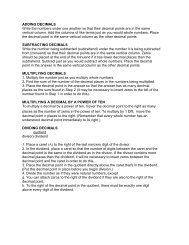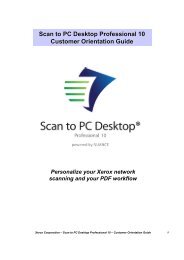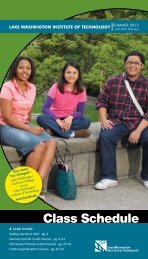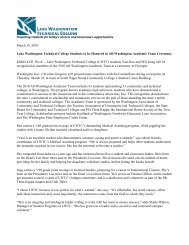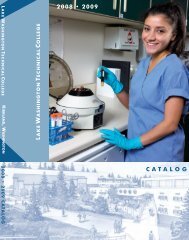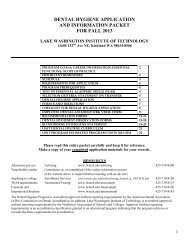2 - Lake Washington Institute of Technology
2 - Lake Washington Institute of Technology
2 - Lake Washington Institute of Technology
You also want an ePaper? Increase the reach of your titles
YUMPU automatically turns print PDFs into web optimized ePapers that Google loves.
ACRT 245 PLASTIC & COMPOSITE<br />
PANEL REPAIRS<br />
4CR<br />
This course focuses on the procedures, product knowledge and tool skills<br />
needed to properly repair plastic and composite panels. Prerequisites: TRAN 110,<br />
TRAN 112, TRAN 113, TRAN 125, or instructor permission. Corequisites:<br />
ACRT 145, ACRT 146, ACRT 246, or instructor permission.<br />
ACRT 246 DISASSEMBLY & REASSEMBLY<br />
TECHNOLOGY & PROCEDURES<br />
4CR<br />
This course focuses on the procedures, product knowledge, and tool skills needed<br />
to fully disassemble and reassemble parts, panels, and assemblies. Prerequisites:<br />
TRAN 110, TRAN 112, TRAN 113, TRAN 125, or instructor permission. Corequisites:<br />
ACRT 145, ACRT 146, ACRT 245, or instructor permission.<br />
ACRT 255 DAMAGE ANALYSIS 4CR<br />
This course focuses on how to perform damage analysis. Prerequisites: TRAN 110,<br />
TRAN 112, TRAN 113, TRAN 125, or instructor permission. Corequisites: ACRT 155,<br />
ACRT 156, ACRT 256, or instructor permission.<br />
ACRT 256 MECHANICAL AND<br />
ELECTRICAL SYSTEMS<br />
4CR<br />
This course focuses on the basics <strong>of</strong> identifying and diagnosing mechanical and<br />
electrical system repair needs. Prerequisites: TRAN 110, TRAN 112, TRAN 113,<br />
TRAN 125, or instructor permission. Corequisites: ACRT 155, ACRT 156, ACRT 255,<br />
or instructor permission.<br />
ACRT 265 ADVANCED NON-STRUCTURAL REPAIR 4CR<br />
In this hands-on course students perform non-structural repairs on<br />
customer vehicles in a body shop environment. Prerequisites: ACRT 226,<br />
ACRT 236, ACRT 246, ACRT 256. Corequisites: ACRT 266, ACRT 267, ACRT 268.<br />
ACRT 266 ADVANCED STRUCTURAL REPAIR 4CR<br />
In this hands-on course students perform structural repairs on customer<br />
vehicles in a shop environment. Prerequisites: ACRT 226, ACRT 236, ACRT 246,<br />
ACRT 256. Corequisites: ACRT 265, ACRT 267, ACRT 268.<br />
ACRT 267 ADVANCED REFINISHING 4CR<br />
In this hands-on course students prep, refinish, and detail customer vehicles.<br />
Prerequisites: ACRT 226, ACRT 236, ACRT 246, ACRT 256. Corequisites: ACRT 265,<br />
ACRT 266, ACRT 268.<br />
ACRT 268 ADVANCED ESTIMATING<br />
& SHOP MANAGEMENT<br />
4CR<br />
In this hands-on course students create estimates for customers and manage the<br />
customer relationships. Prerequisites: ACRT 226, ACRT 236, ACRT 246, ACRT 256.<br />
Corequisites: ACRT 265, ACRT 266, ACRT 267.<br />
APDZ 310 INTRODUCTION TO APPLIED DESIGN 5CR<br />
A survey course <strong>of</strong> concepts and issues in applied design. Design terminology<br />
will be reviewed and contemporary design-related concepts such as human<br />
factors, interaction design, usability, and heuristics will be examined.<br />
Prerequisite: Admission to BTAD program or instructor permission.<br />
APDZ 312 DESIGN THEORY II 5CR<br />
This course provides a survey <strong>of</strong> the field <strong>of</strong> industrial design from historical,<br />
cultural, and multi-disciplinary perspectives. Students will explore theories<br />
underlying industrial design, assess products for usability, and examine design<br />
processes, including ideation, need finding, process documentation, project<br />
definition, scheduling, and team member roles. Prerequisite: APDZ 310 and<br />
admission to BTAD program or instructor permission.<br />
APDZ 321 THE BUSINESS OF DESIGN 5CR<br />
This course provides an overview <strong>of</strong> business vocabulary, functions, processes, and<br />
the design segment for students in the BTAD program. It also addresses aspects <strong>of</strong><br />
management and leadership, law, contracts, and human resources. Case studies <strong>of</strong><br />
design businesses are included. Prerequisite: Admission to the BTAD Program.<br />
Course Descriptions<br />
APDZ 331 MANAGING CREATIVITY<br />
& INNOVATION<br />
5CR<br />
The unique role <strong>of</strong> the manager who is responsible for creation and design is<br />
examined. Particular attention is paid to the skills needed to lead a team <strong>of</strong><br />
creative pr<strong>of</strong>essionals. Prerequisite: Admission to the BTAD Program.<br />
APDZ 332 ENTREPRENEURSHIP & DESIGN 5CR<br />
A practical study <strong>of</strong> how design innovations lead to new opportunities. Issues<br />
<strong>of</strong> copyright, patent, license, marketing, securing capital and freelancing will<br />
be discussed. Students will create a business plan for an entrepreneurial design<br />
venture. Prerequisite: Admission to BTAD program or instructor permission.<br />
APDZ 333 APPLIED DESIGN TECHNOLOGY 5CR<br />
Course designed for BTAD students to learn a new or updated technology<br />
s<strong>of</strong>tware taught in a lower-division course while working directly with an<br />
upper-division faculty advisor to ensure lower-division technology outcomes<br />
and upper-division communication, problem solving and project design<br />
outcomes are met. Prerequisite: Admission to the BTAD Program.<br />
APDZ 334 APPLIED DESIGN THEORY 5CR<br />
Course designed for BTAD student to learn or enhance a skill, technique or<br />
theoretical understanding taught in a lower-division course while working<br />
directly with an upper-division faculty advisor to ensure lower-division course<br />
skills outcomes and upper-division, critical thinking, analytical and project<br />
design outcomes are met. Prerequisite: Admission to BTAD Program and<br />
instructor permission.<br />
APDZ 335 INTRODUCTION TO<br />
COMPUTATIONAL DESIGN<br />
5CR<br />
Computational design emphasizes the use <strong>of</strong> pre-established rules or<br />
parameters to generate multiple designs. The designer learns to critically<br />
assess each design and determine which designs meet the desired idea or<br />
concept. This course provides a survey <strong>of</strong> the discipline <strong>of</strong> computational<br />
design as it relates to theory and application. Prerequisites: Admission to BTAD<br />
program or instructor permission, HUM 311 or HUM 312 recommended.<br />
APDZ 361 DESIGN RESEARCH PROJECT 3CR<br />
Students will complete a culminating project integrating their program<br />
coursework and resulting in a portfolio piece or case study that involves research<br />
and design process from discovery to pro<strong>of</strong> <strong>of</strong> concept, showcasing their abilities.<br />
Prerequisite: Instructor permission.<br />
APDZ 381 THEORY OF INTERACTIVITY 5CR<br />
This course provides a survey <strong>of</strong> the field <strong>of</strong> interaction design from historical,<br />
cultural and industry practice perspectives. Students will study the basics<br />
<strong>of</strong> human perception, explore the rules that govern interaction design, and<br />
examine principles <strong>of</strong> human-computer interaction. Prerequisites: Admission<br />
to the BTAD Program or instructor permission.<br />
APDZ 382 BRAND COMMUNICATION<br />
AND MARKETING<br />
5CR<br />
This course provides a survey <strong>of</strong> the field <strong>of</strong> brand communication design and<br />
marketing from historical, cultural and industry practice perspectives. Students<br />
will study the principles <strong>of</strong> brand communication and contemporary marketing<br />
theory. Prerequisites: Admission to the BTAD Program or instructor permission.<br />
APDZ 383 DIGITAL DESIGN FABRICATION<br />
AND PROTOTYPING<br />
5CR<br />
This course provides a survey <strong>of</strong> the field <strong>of</strong> design fabrication and prototyping<br />
from the perspective <strong>of</strong> design, materials, and industry practices. Students<br />
will be guided through a lab environment using rapid prototyping devices<br />
and physical modeling techniques. Theoretical underpinnings will suggest<br />
how the “machine” is becoming more integrated into the design process.<br />
Prerequisites: ENGT 131 or MMDP 124 (or CAD equivalent) and admission to<br />
the BTAD Program or instructor permission.<br />
7<br />
Course Descriptions<br />
2 0 1 3 - 2 0 1 4 • L A K E W A S H I N G T O N I N S T I T U T E O F T E C H N O L O G Y • C A T A L O G 183



